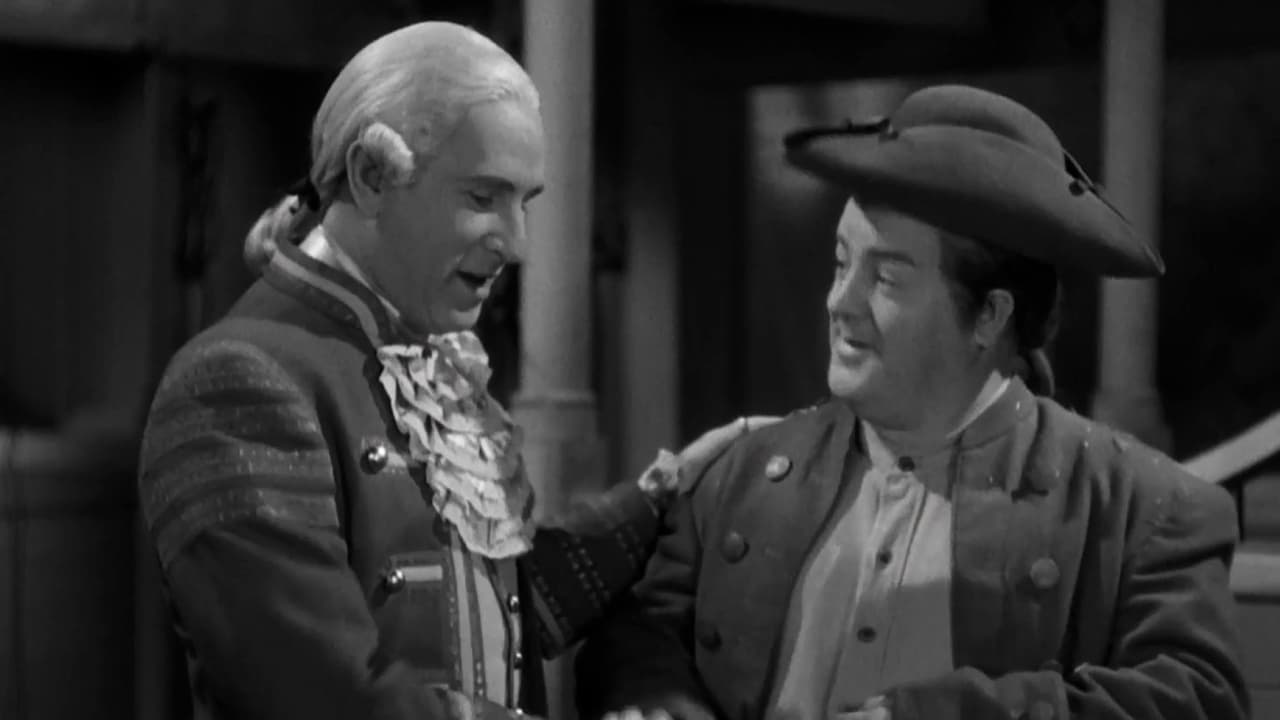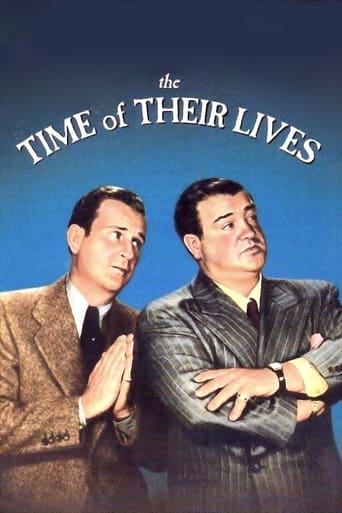

Costello as an inept ghost from revolutionary times and Abbott as a psychiatrist, of all things. This is likely the most unusual of the A&C comedies. Actually, the results are more like a Reynolds and Costello comedy than the usual A&C pairing. Instead, Abbott's more like one of the cast rather than a headliner, while the two have few scenes together. I gather the pair were feuding at the time, which may have something to do with the departure from the usual.Still, the movie's both funny and inventive. Reynolds and Costello are two wandering spirits from George Washington's time condemned to haunt an estate until they can clear themselves of bogus charges of treason. Needless to say, Costello makes a laughably inept ghost—he just can't seem to get that disappearance wiggle down right. Nonetheless, he and Reynolds play off one another nicely with her getting the "straight man" role in fetching fashion.There's a number of inside jokes with references to Rebecca (1940) and Bogart & Bacall (just whistle if you want me). And in a casting master stroke, there's the icy Gale Sondergaard (Emily) on hand to give everyone the shivers. I really like the last sequence with its touch of humorous irony that's fitting for the supernatural hijinks that've gone before.This is definitely not formula A&C, but may be their most inventive and among their loony best.
... View More1780: Treachery as Victory Nears Time of Their Lives opens in 1780 with the Rebels confidentally looking forward to ultimate success. Behind the scenes Tom Danbury (Jess Parker) the master of the manor is plotting to subvert the Revolution. When Melody Allen (Majorie Randolph) Danbury's fiancée, the future mistress of the great estate discovers the treason, Melody enlists Horatio Prim, a faithful tinker (Lou Costello), who can gain access to George Washington. Though a letter of recommendation from Washington to the tinker been stolen by the snide Cuthbert (Bud Abbot), Melody and Horatio Prim the Tinker set off to report Master Danbury. Accidentally, the aristocratic Melody and the commoner Horatio are cut down by friendly fire and damned to roam the grounds of the manor for eternity. Redemption From DamnationTheir chance to escape eternal damnation comes almost 150 years later, the new master of the manor falls into a spell of melancholia and is treated by a psychiatrist Dr Greenway (Bud Abbot) a great-grandson of Cuthbert, a soft, indecisive bumbling look a like for his snide ancestor. As the haunting proceeds Dr Greenway (Bud Abbot), the descendant of Prim's rival Cuthbert, accuses the unseen ghosts of being "out to get him." Meanwhile the 18th century ghosts confronted with modernity attribute all the marvels of the Twentieth Century to the genius of Ben Franklin. After all Dr Franklin "was always inventing things." Eventually, all of the quick accept a séance as the only cure for the strange rumblings around the manor. The letter from Geroge Washington is recovered in a hidden compartment in a clock along with Tom Danbury's 150-year-old confession. The Silver Path to Heaven Melody is carried to heaven on a silver ray of light, while St. Pete goes fishing and leaves the Tinker at the gate. Cultural ImpactThe film certainly is not history, even if it is unique for Abbot and Costello: no trademarked jokes, Abbot in character as Cuthbert and out of his type cast playing the namby-pam, indecisive psychiatrist Dr Greenway, and indeed little interchange between Abbot and Costello at all. Though there are funny scenes, the film is more of a fantasy or a gentle ghost story than a comedy. As a ghost story about the Revolution it was not without literary precedent among the legends of the Hudson River Valley or the old Long Island towns. As a fantasy, it was superbly acted and staged. The film is remarkable as part of the culture of the Revolution for its exposition of common American Beliefs and misbeliefs. The Tories were rich, smooth and treacherously duplicit. Old family lines may be founded by the cunning and the shrewd, but the blood wears thin and eventually flows into the inadequate. In the long run "Everyman" will triumph over evil even if it takes 150 years. It is certainly a pleasant film to watch even if what followed was not pleasant for the two greats of American comedy. Aftermath of the Film At the time, Time of Their Lives was filmed, Abbot and Costello verged on a split up. As unpleasant as the circumstances were between the two giants as filming proceeded with Times of Their Lives, each actor might have matured into separate careers in dramatic film. Unfortunately, the tragic death of Lou Costello's infant son in a pool accident impeded the rupture. Abbot stood by his partner throughout Lou's personal crisis. The team had a hit TV show in 1952, but in the movies, Abbot and Costello played together in B films which spoofed popular horror and monster movies. The glory days were over. Costello took to gambling; Abbot, the bottle. The IRS took them both "to the cleaners." After the audit wrecked the team, Costello briefly tested more dramatic roles, before his death in 1957 of heart failure. Costello who had begun in the early 1950s to dabble in Republican politics died without fulfilling his dream of scripting and playing the serious story of Mayor Fiorello LaGuardia, the first Italian-American mayor of a major US city. Abbot faded into obscurity until his death in 1974 revived interest in the pair. Some have tried to read a wider political theme into Time of Their Lives, putting away the ghosts of the past and getting on with the new modern age. However, other than the attempt to launch Lou Costello out of comedy and into more serious roles, the movie lacks a serious underlying message. Even without a serious undertone, Time of Their Lives remains a superior film
... View MoreThis is such a sweet little movie. It has beautiful music by Boccherini. It also has a beautiful tune called "Drink to Me Only With Thine Eyes." There is love in it. Yes, it has a seance. This is something the Bible talks about negatively, but I think that if you can realize that this is just a movie and that those things are forbidden by God, this is all right. All in all, it is a very purposeful movie in that though there is sadness, it is met with happiness in that there is a resolution. We need to watch movies like this and to love one another, for we don't know when we will be gone. I am a Christian, and I think this movie is good for Christians, though, as I said, just taking into account the seance part and realizing that that is forbidden by God is what is needed; I guess this is a somewhat liberal view, whereas some may say not to watch the movie because of this; God knows the difference though, and He is love. I delight in sweet movies such as this, absolutely clean and pleasant. Thank you for letting me comment. Enjoy the good movie!! and in your heart thank the players for exuding such joyous sweetness!!
... View MoreMost fans of Abbott & Costello, if they don't consider THE TIME OF THEIR LIVES the best film they made consider it among the best films they made. It is an unusual film - their is some interplay between the two in the 18th Century sequences, where Abbott's Cuthbert plays his normal bossy and unscrupulous acquaintance to Costello's patriotic Horatio. To add to their normal problems with each other, they both like the same servant girl. Horatio has one prized possession - a letter from George Washington praising his patriotism. Unfortunately, the servant girl's employer is a large landowner who is a traitor (and a member of Benedict Arnold's conspiracy). The landowner has a girlfriend named Melonie, played by Marjorie Reynolds (probably her best remembered role after Bing Crosby's girlfriend in HOLIDAY INN). Melonie is momentarily in control of the letter, but her boyfriend takes it and hides it inside an expensive clock. Then the patriots arrive - Major Andre has been captured and the conspiracy revealed. Everyone flees, but Costello and Reynolds are shot and killed before they get away. A curse is put over their remains in their grave on the estate that (mistakenly considered) traitors they are doomed to be forever at unrest there.The ghosts of the two find they literally are stuck their (the special affects are good - they accidentally run through each other and find they are wearing each other's clothing). They see a sign that reveals the curse that was unfairly put on them. Both know if the letter is found they would be released. But time passes. They don't know where the note is, or how to get to it.Comes the 20th Century and Binnie Barnes, Abbott, and John Shelton show up - Abbott a descendant of the 18th Century scoundrel. They are planning to turn the old estate into an inn. Costello, with two centuries of bile and anger building up in him, torments Abbott (in this film Costello maintains the whip hand for a change). Gradually, with the aid of medium Gale Sondergaard, they learn what happened. And Abbott decides to redeem his family name by freeing the ghosts.It is surprising that the Arnold Conspiracy is the only incident of the American Revolution that seems to have been properly handled in the movies, both here and in the later THE SCARLET COAT. But that was a more in depth look at the tragedy and heroism of Major John Andre. Here the Arnold conspiracy, while the motor for the plot, is only shown in the first twenty minutes of the film (then it goes modern), and the film (for all the tragedy for Costello and Reynolds in their rightful lifetimes) is mostly comic. The antics of the pair, in particular Costello's campaign against the hapless modern Abbott, is funny - living up to the first part of the pun of the title. For all their anguish at being cursed unfairly, the two ghosts get to enjoy themselves - they do have the time of their lives. The other half of the pun, of course, deals with the key to their salvation: that all important letter - hidden inside an 18th Century timepiece.
... View More